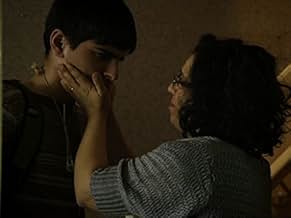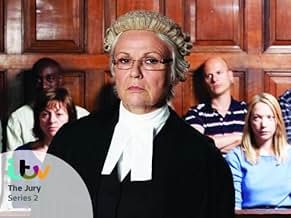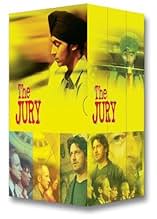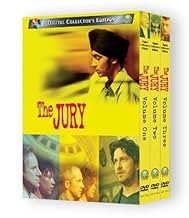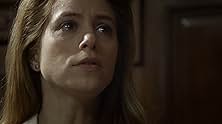AVALIAÇÃO DA IMDb
7,6/10
1,3 mil
SUA AVALIAÇÃO
Adicionar um enredo no seu idiomaTwelve men and women are called for jury service in the retrial of a man accused of a triple murder after the High Court overturns the original verdict.Twelve men and women are called for jury service in the retrial of a man accused of a triple murder after the High Court overturns the original verdict.Twelve men and women are called for jury service in the retrial of a man accused of a triple murder after the High Court overturns the original verdict.
Explorar episódios
Avaliações em destaque
Having now seen parts of this twice, I think that what makes this really great, and gripping, is the character development and the acting. I especially liked the recovering alcoholic and Rose, but all the characters were well developed and real (except, perhaps, the judge, the lawyers, and the defendant - but this is about the JURY).
I am as much against political correctness as the next person, but I don't think that was what this was about. That was part of the background, but not the story. The story was about the people.
I am as much against political correctness as the next person, but I don't think that was what this was about. That was part of the background, but not the story. The story was about the people.
This was quite an ambitious undertaking; a six part exploration of not only the dynamics of the jury room but also the effects of the criminal trial on the lives of jurors, their families, the victim's family and the accused and his family.
The jury here is almost perversely diverse, with everyone from a young single black mother to a trainee priest. We follow seven of the jurors home during adjournments and realise that strains and stresses of the jury box and room aren't the half of it. One unlucky juror has a father-in law from hell who wants in on the case. Another is a recovering alcoholic who is finding it hard to stay on the straight and narrow, despite his invaluable `personal trainer' Juror Rose (Helen McCrory) is unlucky enough to be married to a control freak (she took on jury service to get away from him) and to then get friendly with the alcoholic. Juror Jeremy, a down and out businessman, is thrown by an accidental encounter with the man whose sure fire deal nearly ruined him. The trainee priest is having doubts about his vocation and the old lady he befriends finds out she is seriously ill.
The courtroom scenes on the other hand run pretty smoothly (though there is a surprise witness). We have top leading counsel of course, Anthony Sher for the prosecution and Derek Jacobi for the defence, but their performances are so glossy and professional as to be almost boring. The judge is almost invisible, despite a lot of noise from the gallery.
This brings me to two irritating aspects. This being a `racial' killing (Sikh boy accused of killing white schoolboy bully with ceremonial sword) there is a demonstration by both sides outside the Old Bailey every morning and afternoon. I can't believe the police would allow the jurors to be routinely intimidated in this way (though most of them did seem to have other things on their minds.) Surely there is a back door (or they could have bussed them out). Secondly, the practice here in Australia is to `sequester' the jury members ie cut them off from family and friends and anyone else who might try to nobble them after they retire to consider their verdict. We copied this practice from the English. Surely they still sequester the jury at the Old Bailey?
Technical grizzles aside this was a very watchable show with some nice acting. There are weaknesses in some of the plotlines and there's rather a ham-fisted attempt to leave things up in the air at the end, but the film reveals the value of the jury as an institution even if individual jurors might be pretty quirky. To some extent majority verdicts (which we don't have in NSW) iron out some of these, though the storyline here suggests such verdicts have problems of their own.
In the end the jurors do their job conscientiously to the best of their ability, despite all the distractions. Whether they are right or wrong is hardly the point; they represent humanity in the administration of justice, which would be mighty cold and austere without them.
The jury here is almost perversely diverse, with everyone from a young single black mother to a trainee priest. We follow seven of the jurors home during adjournments and realise that strains and stresses of the jury box and room aren't the half of it. One unlucky juror has a father-in law from hell who wants in on the case. Another is a recovering alcoholic who is finding it hard to stay on the straight and narrow, despite his invaluable `personal trainer' Juror Rose (Helen McCrory) is unlucky enough to be married to a control freak (she took on jury service to get away from him) and to then get friendly with the alcoholic. Juror Jeremy, a down and out businessman, is thrown by an accidental encounter with the man whose sure fire deal nearly ruined him. The trainee priest is having doubts about his vocation and the old lady he befriends finds out she is seriously ill.
The courtroom scenes on the other hand run pretty smoothly (though there is a surprise witness). We have top leading counsel of course, Anthony Sher for the prosecution and Derek Jacobi for the defence, but their performances are so glossy and professional as to be almost boring. The judge is almost invisible, despite a lot of noise from the gallery.
This brings me to two irritating aspects. This being a `racial' killing (Sikh boy accused of killing white schoolboy bully with ceremonial sword) there is a demonstration by both sides outside the Old Bailey every morning and afternoon. I can't believe the police would allow the jurors to be routinely intimidated in this way (though most of them did seem to have other things on their minds.) Surely there is a back door (or they could have bussed them out). Secondly, the practice here in Australia is to `sequester' the jury members ie cut them off from family and friends and anyone else who might try to nobble them after they retire to consider their verdict. We copied this practice from the English. Surely they still sequester the jury at the Old Bailey?
Technical grizzles aside this was a very watchable show with some nice acting. There are weaknesses in some of the plotlines and there's rather a ham-fisted attempt to leave things up in the air at the end, but the film reveals the value of the jury as an institution even if individual jurors might be pretty quirky. To some extent majority verdicts (which we don't have in NSW) iron out some of these, though the storyline here suggests such verdicts have problems of their own.
In the end the jurors do their job conscientiously to the best of their ability, despite all the distractions. Whether they are right or wrong is hardly the point; they represent humanity in the administration of justice, which would be mighty cold and austere without them.
10swanzer
A very compelling story about a young Seikh man who is charged with murdering a classmate. I enjoyed the relationships the characters formed with each other and how they were brought together for the conclusion of the story. I thoroughly enjoyed Gerry Butler's role as a young man fresh out of rehab struggling to make a new life for himself despite all his difficulties. The ensemble cast draws you into their own personal trials as well as their fight for the truth in the trial they sit for. The story keeps you guessing and even in the end, you still are not sure what is the actual truth. A great British version of the American-types of "Law and Order" and "The Practice" series.
I set out to watch this 6 hour British mini series for one reason: I'm a huge fan of Gerard Butler's. I came away amazed at how really good I thought it was. The mini-series deals with the trial of a Sikh student accused of brutally killing a fellow student (and compelling evidence both for and against). And while it does indeed explore the trial itself, the beauty of this series is the exploration of the jurors and their lives (something rarely done). It takes 7 of the 12 jurors and shows what is going on in their lives (and by proxy, what their lives the last several years must have been like). You have the alcoholic just out of rehab the first morning of the trial (Butler), the single mother with her own "mom" issues, the seminary student torn between his love of God and his love of a woman, the old Catholic woman who is clearly lonely, the man who had lost his fortune a while back and is no longer financially well-off, the woman who is controlled by her ex-military and semi-crippled husband and last the responsible citizen who is pleased and overwhelmed at the duty placed on him (and who has the most clueless in-laws). You have the not-so-nice prosecutor (played admirably by Antony Sher) and the decent defense barrister (played well as always by Derek Jacobi). Almost all the characters are to some degree stereotypes, but it is how the actors portray them and the way they are written--the way these stories unfold--that is so special. These performances are just truly wonderful (notably Butler and the actors portraying the abused wife, the single mom and the duty bound juror) The ultimate outcome of the trial, while important, takes second place to the jurors' outcome and the central question: how difficult is it to reach a decision on guilt or innocence when you can NEVER really know?
I'm American and have been watching British drama for the past couple of years. I now prefer the more realistic productions than all the glitz and glamour of newer American shows.
We usually have no insight before starting a a series which was the case with The Jury. To keep it short and sweet, the production, the characters and the story were all well done. Each character had a unique story line and the whole series was easy to follow.
But one of the strongest compliments I can give the show was how the ending wrapped things up nice and clean. No uncertain twists that make you question the outcome. WATCH IT.
We usually have no insight before starting a a series which was the case with The Jury. To keep it short and sweet, the production, the characters and the story were all well done. Each character had a unique story line and the whole series was easy to follow.
But one of the strongest compliments I can give the show was how the ending wrapped things up nice and clean. No uncertain twists that make you question the outcome. WATCH IT.
Você sabia?
- CuriosidadesIn season one, episode one, a computer screen list showing the names of potential jury members contains the names of fourteen characters from The Bill (1984). They are Reg Hollis, Nick Klein, Duncan Lennox, Debbie McAllister, Jack Meadows, Andrew Monroe, Dave Quinnan, Kass Rickman, Paul Riley, Vic Singh, Kate Spears, Roz Clarke, Tony Stamp, and Des Taviner. Some of the potential jurors' addresses also correspond to street names used on the show.
- ConexõesFeatured in The Jury: The Jurors (2011)
Principais escolhas
Faça login para avaliar e ver a lista de recomendações personalizadas
- How many seasons does The Jury have?Fornecido pela Alexa
Detalhes
- Data de lançamento
- País de origem
- Central de atendimento oficial
- Idioma
- Também conhecido como
- El jurado
- Locações de filme
- Empresas de produção
- Consulte mais créditos da empresa na IMDbPro
Contribua para esta página
Sugerir uma alteração ou adicionar conteúdo ausente



